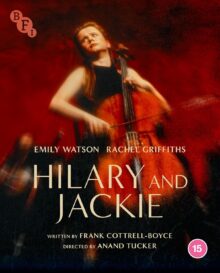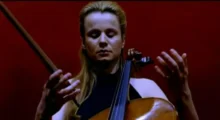
Director: Anand Tucker
Screenplay: Frank Cottrell Boyce
Based on a Novel by: A Genius in the Family by Hilary and Piers du Pre
Starring: Emily Watson, Rachel Griffiths, Celia Imrie, Charles Dance, David Morrissey, James Frain
Country: United Kingdom
Running Time: 120 min
Year: 1998
BBFC Certificate: 15
When the great actor Robert Redford died recently, a work colleague had to ask me who he was. They were too young to know. It occurred to me that there are many such cultural figures who, for wont of a better phrase, are passing out of popular memory. It will be up to cultural memory to keep their legacies alive. That thought resonated with me throughout my viewing of the film “Hilary and Jackie,” reissued for the first time on Blu-ray by the BFI. The great cellist Jacqueline du Pre has more than her fair share of fans in the 21st century, but her career, life and legacy are most certainly fading from popular memory. The film was controversial upon release and this reissue is sure to re-open those old wounds and expose them to a new audience.
In the hands of a lesser director, “Hilary and Jackie” could have been a very worthy prestige drama about the meteoric rise and tragic fall of a celebrated classical musician. The film doesn’t conform to the rules of the creative artist biopic, even if at times it does indulge in tropes all too familiar to the subgenre. Instead, the film is a powerful examination of how the unbreakable bond between two siblings is tested to near destruction. Anand Tucker’s directorial blend of foreboding and fantasy is clear from the outset. On a windswept beach, the young Hilary (Keeley Flanders) and Jackie (Auriol Evans) frolic and play games, then encounter a mysterious woman in silhouette, and finally whisper consolations to each other.

Brought up in a middle-class environment of love and aspiration, the sisters’ musical skills are nurtured by their mother Iris (Celia Imrie), and adoring father Derek (Charles Dance). Flautist Hilary is the star of the household. Jackie learns that in order to attend her Hilary’s performances, she must be her equal on her given instrument, the cello. Her fulsome dedication pays off, and her emerging talent is fully encouraged by a series of mentors and donors, leading to her first solo performance at the age of just sixteen. Jackie’s ascent to celebrity and success are a savage blow to Hilary’s status and sense of self as a musician, and she suffers under the weight of brutal academic instruction. Her burgeoning relationship with Christopher ‘Kiffer’ Finzi (David Morrissey) offers her a new path, as Jackie’s stature as a star performer leads her all over the world, and into the arms of fellow rising star Daniel Barenboim (James Frain). With such a starry cast performing at or near their best, some actors do struggle to stand out. Bill Patterson lends an air of authority to his small role as one of Jackie’s mentors, but Rupert Penry-Jones merely gets to weep modestly whilst driving a Ford Granada in the role of younger brother Piers du Pre.
At the core of the film are the constrasting performances by Rachel Griffiths as Hilary and Emily Watson as Jackie. Griffiths displays great warmth and nuance as the seemingly overshadowed Hilary, who finds strength and contentment as a wife and mother. Emily Watson delivers one of her most fearless and unsparing performances as the vivacious yet tormented Jackie. A bedside conversation at twilight is the setting for one of the great confrontations in recent cinema, where the sisters verbally lacerate each other in the darkness. The film’s split narrative – we first see Hilary’s story, then Jackie’s – allows both sides of their stories to unfold, and how the rupture between them finally occurs.

Whatever happened between Kiffer and Jackie, with or without the consent of Hilary contains a dramatic truth irrespective of reality, and the controversy that surrounds them. Frank Cottrell Boyce’s excellent screenplay is clearly a dramatization of the sisters’ lives and was written without knowledge of Hilary’s memoir. There are scenes of unremitting horror where Jackie’s inner turmoil finally spills over into her daily life. The sequence where Jackie starts to lose sensation in her body before a performance is staged with a flamboyant sense of dread that is pure giallo. The film’s confident use of pathetic fallacy, with the elements mirroring the emotions of the sisters is given full rein when Hilary and Jackie are reunited but not reconciled as the Great Storm of 1987 rages outside.
“Hilary and Jackie” is a remarkable, yet emotionally devastating film. The anguish of Jackie’s physical decline and final years are harrowing to watch, as are the deep emotional scars that Hilary has to bear throughout. It is a testament to all involved that the story of two sisters never loses sight of the love that they had for each other.
This blu ray release contains a fascinating array of special features:
Restored in 2K and presented in High Definition
Newly recorded audio commentary by dramatist, composer and author, Neil Brand
Avec Sonia Wieder-Atherton (2003, 52 mins): a celebration of cellist Sonia Wieder-Atherton, showing her artistry as she plays and discusses her life in music
Instruments of the Orchestra (1946, 18 mins): Sir Malcolm Sargent presents, conducts and comments on the performance of the different instruments of the London Symphony Orchestra in this film by Muir Mathieson
Selected Tales from Hoffnung (1964, 21 mins total): three animations from Halas and Batchelor’s Tales from Hoffnung series based on the drawings of artist, comic, and raconteur, Gerard Hoffnung
Our Magazine No 2 (1952, 10 mins): this edition of the CFF newsreel includes a rousing number by the London Fields Primary School Percussion Band
Trailer
**FIRST PRESSING ONLY** Illustrated booklet with new writing on the film and on Avec Sonia Wieder-Atherton by Rachel Pronger and writing on the extras by Jez Stewart, Katy McGahan and Vic Pratt
Neil Brand’s commentary is deft and thoughtful and is especially useful regarding the various cultural references throughout the film: the recurring musical motifs relating to du Pre’s career – Elgar, Dvorak, Haydn. – the key poem that Hilary recites (“Romance” by Walter J. Turner), and the filming locations used, where parts of London were recreated by areas of Liverpool. He is especially effusive about the late Barrington Pheloung’s melancholy score for the film, which is indeed truly superb. The LSO archive and Children’s Film Foundation films are diverting period fragments, and the Hoffnung animations are affectionate and witty satires of classical music.
The real treasure here is Avec Sonia Wieder-Atherton, a stunning documentary about the extraordinary cellist Sonia Wieder- Atherton, filmed for French television by Chantal Akerman. When I saw Akerman’s name appear, my heart leapt with joy. This film is one of the very best special features on any home cinema release this year.
The booklet contains an illuminating lead essay by Rachel Pronger that delves into the film’s specific controversies and the musical biopic as a genre, producer Andy Patterson’s provides his thoughts on the film as well archive production notes, and Jez Stewart, Katy McGahan and Vic Pratt provide their combined expertise to the special features.


Leave a Reply